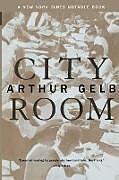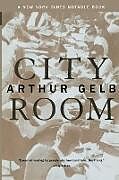City Room
Einband:
Kartonierter Einband
EAN:
9780425198315
Untertitel:
Englisch
Genre:
Briefe & Biografien
Autor:
Arthur Gelb
Herausgeber:
Penguin Publishing Group
Anzahl Seiten:
674
Erscheinungsdatum:
02.11.2004
ISBN:
0425198316
Zusatztext Praise for City Room Essential reading for people who love (and hate) The Times .Gay Talese A large window into the inner workings of one of the country's premier institutionsenlightening as it is entertaining. Los Angeles Times Book Review Superbly written! with integrity and elegance.Elie Wiesel A magnificent memoir of coming of age amidst the vibrancy and kaleidoscopic life of America's greatest city! seen from the perspective of a brilliant career on our greatest newspaper. City Room is a grand read.Neil Sheehan A sense of intelligent innocence permeates this affectionate memoir.Pete Hamill Rich with personalities. The New Yorker Informationen zum Autor Arthur Gelb began as a copy boy at the New York Times in 1944 and went on to play a major role at the paper until his retirement in 1989, serving as a critic, chief cultural correspondent, metropolitan editor, deputy managing editor and managing editor. With his wife, Barbara, he also authored two definitive and acclaimed biographies of the playwright Eugene O'Neill. Klappentext A New York Times Notable Book Arthur Gelb was hired by The New York Times in 1944 as a night copyboythe paper's lowliest position. Forty-five years later, he retired as its managing editor. Along the way, he exposed crooked cops and politicians, mentored a generation of our most-talented journalists, was the first to praise the as-yet-undiscovered Woody Allen and Barbra Streisand, and brought Joe Papp instant recognition. From D-Day to the liberation of the concentration camps, from the agony of Vietnam to the resignation of a President, from the fall of Joe McCarthy to the rise of the "Woodstock Nation, Gelb gives an insider's take on the great events of this nation's historywhat he calls "the happiest days of my life. ONE AS I ENTERED THE LOBBY of The New York Times at 10:30 P.M., normally deserted at that late hour, I found myself in step behind a lissome woman with wavy ash-blond hair, wearing a snug-fitting black dress. It was late May 1944, my first week as a copyboy, the humblest rank on the newspaper's staff. I was on my way back to the city room, second home to a legion of reporters and editors, all collaborators in the daily ritual of getting the paper out in time to meet truck, mail and rail schedules. Sammy Solovitz, also a copyboy, and Iboth of us just turned twentywere balancing bundles of newspapers on our shoulders. They were early editions of competing New York dailies, and the ink, still damp, smudged our hands and clothes. We had been sent to fetch the papers from a newsstand around the corner in Times Square, so that the editors could check whether The Times had missed any important stories. I was uneasily aware of the odd couple Sammy and I madehe an elfin four-foot-nine and I a gangling six-foot-two. Despite the bundle weighing him down, Sammy nonchalantly blew smoke rings, mimicking the soldier in Times Square's bigger-than-life Camel cigarette ad. By contrast, I must have appeared self-consciously earnest as I stared straight ahead through horn-rimmed glasses. My discomfort galloped nearly out of control when the woman we had followed into the elevator turned around, and I gazed into the sapphire eyes of Madeleine Carrollfor me, the screen's most beautiful actress. Among the films in which she had starred were The 39 Steps, the Hitchcock thriller, and My Favorite Blonde, with Bob Hope, and I had spent a good part of my adolescence fantasizing about her. When the elevator door opened onto the reception area of the third-floor city room, I was frozen. Sammy had to tug my arm and lead me out. Instead of following him into the city room, I rang for the ascending elevator and, when it returned, I asked my new friend, Herman, the white-gloved elevator operator,...
Praise for City Room
“Essential reading for people who love (and hate) The Times.”—Gay Talese
“A large window into the inner workings of one of the country’s premier institutions…enlightening as it is entertaining.”—Los Angeles Times Book Review
“Superbly written, with integrity and elegance.”—Elie Wiesel
“A magnificent memoir of coming of age amidst the vibrancy and kaleidoscopic life of America’s greatest city, seen from the perspective of a brilliant career on our greatest newspaper. City Room is a grand read.”—Neil Sheehan
“A sense of intelligent innocence permeates this affectionate memoir.”—Pete Hamill
“Rich with personalities.”—The New Yorker
Autorentext
Arthur Gelb began as a copy boy at the New York Times in 1944 and went on to play a major role at the paper until his retirement in 1989, serving as a critic, chief cultural correspondent, metropolitan editor, deputy managing editor and managing editor. With his wife, Barbara, he also authored two definitive and acclaimed biographies of the playwright Eugene O’Neill.
Klappentext
A New York Times Notable Book
Arthur Gelb was hired by The New York Times in 1944 as a night copyboy—the paper's lowliest position. Forty-five years later, he retired as its managing editor. Along the way, he exposed crooked cops and politicians, mentored a generation of our most-talented journalists, was the first to praise the as-yet-undiscovered Woody Allen and Barbra Streisand, and brought Joe Papp instant recognition. From D-Day to the liberation of the concentration camps, from the agony of Vietnam to the resignation of a President, from the fall of Joe McCarthy to the rise of the "Woodstock Nation,” Gelb gives an insider's take on the great events of this nation's history—what he calls "the happiest days of my life.”
Zusammenfassung
A New York Times Notable Book
Arthur Gelb was hired by The New York Times in 1944 as a night copyboy—the paper’s lowliest position. Forty-five years later, he retired as its managing editor. Along the way, he exposed crooked cops and politicians, mentored a generation of our most-talented journalists, was the first to praise the as-yet-undiscovered Woody Allen and Barbra Streisand, and brought Joe Papp instant recognition. From D-Day to the liberation of the concentration camps, from the agony of Vietnam to the resignation of a President, from the fall of Joe McCarthy to the rise of the “Woodstock Nation,” Gelb gives an insider’s take on the great events of this nation's history—what he calls “the happiest days of my life.”
Leseprobe
ONE
AS I ENTERED THE LOBBY of The New York Times at 10:30 P.M., normally deserted at that late hour, I found myself in step behind a lissome woman with wavy ash-blond hair, wearing a snug-fitting black dress.
It was late May 1944, my first week as a copyboy, the humblest rank on the newspaper’s staff. I was on my way back to the city room, second home to a legion of reporters and editors, all collaborators in the daily ritual of getting the paper out in time to meet truck, mail and rail schedules.
Sammy Solovitz, also a copyboy, and I—both of us just turned twenty—were balancing bundles of newspapers on our shoulders. They were early editions of competing New York dailies, and the ink, still damp, smudged our hands and clothes. We had been sent to fetch the papers from a newsstand around the corner in Times Square, so that the editors could check whether The Times had missed any important stories.
I was uneasily aware of the odd couple Sammy and I made—he an elfin four-foot-nine and I a gangling six-foot-two. Despite the bundle weighing him down, Sammy nonchalantly blew smoke rings, mimicking the soldier in Times Squar…

Leider konnten wir für diesen Artikel keine Preise ermitteln ...
billigbuch.ch sucht jetzt für Sie die besten Angebote ...
Die aktuellen Verkaufspreise von 6 Onlineshops werden in Realtime abgefragt.
Sie können das gewünschte Produkt anschliessend direkt beim Anbieter Ihrer Wahl bestellen.
Loading...
Die aktuellen Verkaufspreise von 6 Onlineshops werden in Realtime abgefragt.
Sie können das gewünschte Produkt anschliessend direkt beim Anbieter Ihrer Wahl bestellen.
| # | Onlineshop | Preis CHF | Versand CHF | Total CHF | ||
|---|---|---|---|---|---|---|
| 1 | Seller | 0.00 | 0.00 | 0.00 |
